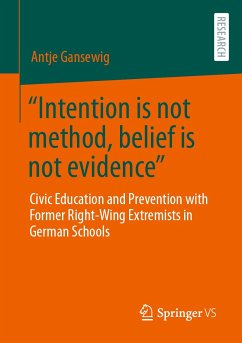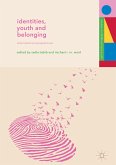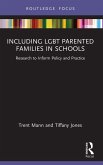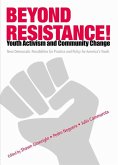For over 20 years, school interventions involving former right-wing extremists have been popular in Germany. In practice, they are advertised and conducted as both civic education and extremism prevention. This book uses an evidence-based and interdisciplinary approach to examine the potentials and challenges of this format. It provides a thematic embedding of German application, a comprehensive review of attributed impact assumptions and the state of related research. Furthermore, this research offers highly valuable, unique and comprehensive insights based on empirical evidence. It thus contributes to a better understanding of the format and its complexity. Overall, the findings give no clear indication that the involvement of former right-wing extremists in schools initiate civic education processes or prevent political extremism. Rather, the investigation found fundamental needs for additional research, modification, and sensitization. In this vein, this book makes a pioneer contribution to quality assurance and evaluation research in civic education and extremism prevention.
About the author
Dr. Antje Gansewig worked in the fields of political extremism, crime prevention and civic education for several institutions over the last 15 years (e.g., National Center for Crime Prevention, Federal Agency for Civic Education). Currently, she is a researcher at the University of Oldenburg, Institute of Social Sciences, Department of Civic Education.
Dieser Download kann aus rechtlichen Gründen nur mit Rechnungsadresse in A, B, BG, CY, CZ, D, DK, EW, E, FIN, F, GR, HR, H, IRL, I, LT, L, LR, M, NL, PL, P, R, S, SLO, SK ausgeliefert werden.
Es gelten unsere Allgemeinen Geschäftsbedingungen: www.buecher.de/agb
Impressum
www.buecher.de ist ein Internetauftritt der buecher.de internetstores GmbH
Geschäftsführung: Monica Sawhney | Roland Kölbl | Günter Hilger
Sitz der Gesellschaft: Batheyer Straße 115 - 117, 58099 Hagen
Postanschrift: Bürgermeister-Wegele-Str. 12, 86167 Augsburg
Amtsgericht Hagen HRB 13257
Steuernummer: 321/5800/1497
USt-IdNr: DE450055826
Bitte wählen Sie Ihr Anliegen aus.
Rechnungen
Retourenschein anfordern
Bestellstatus
Storno









